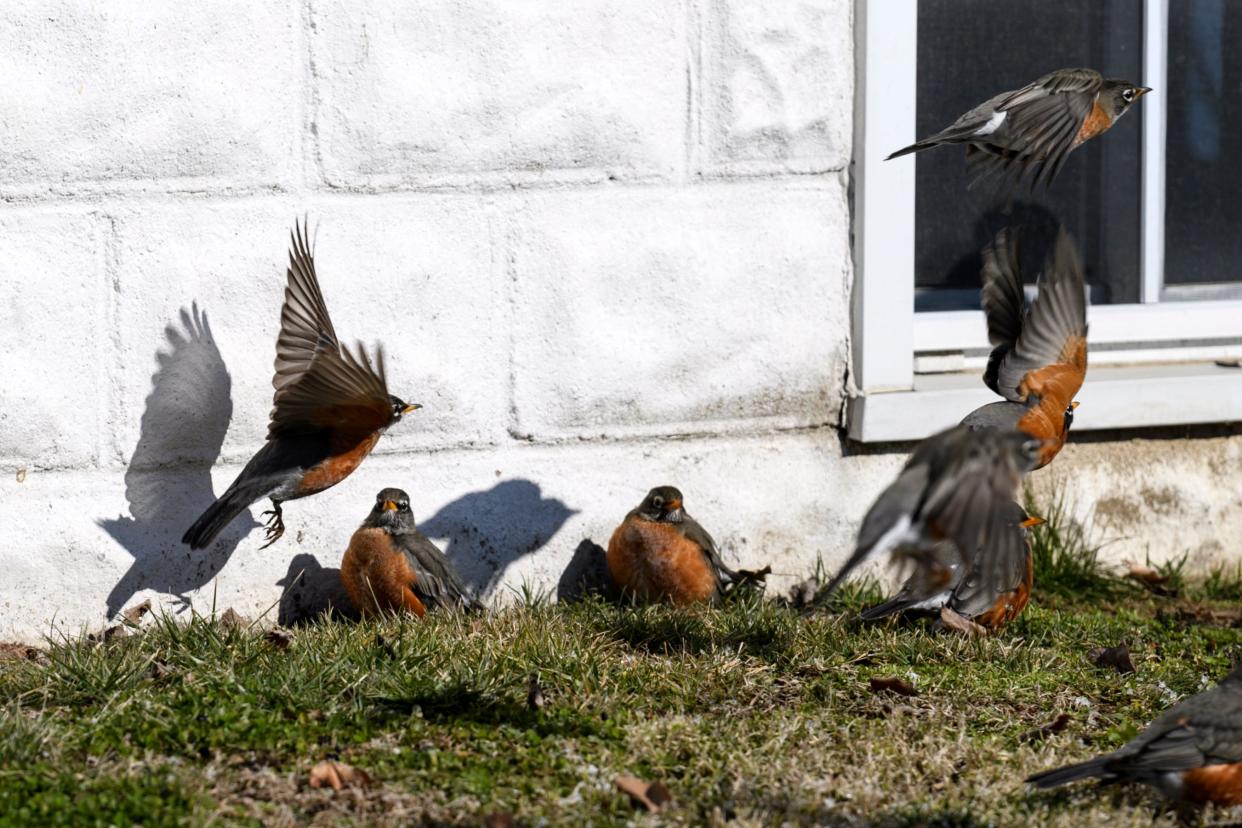Fly along with migrating robins on their fantastic voyage

Imagine packing your bags every year for a long road trip with no GPS, no travel guides, and just your instincts to guide you.
That's exactly what robins in Missouri do as winter approaches. But why do these feathered friends embark on such a journey — and what's life like on the road and in their winter retreats? Let's fly along with these birds and uncover their winter secrets.
To stay or not to stay
As temperatures in Missouri drop and the ground hardens, making it tough for robins to dig up their favorite earthworm meals, they face a choice. Stay or go.
Migration is a survival tactic. The promise of abundant food and milder climates down south becomes irresistible.
Not all robins get the travel bug. Some decide to stick around in Missouri, braving the cold. These hardy stayers switch their diet to fruits and berries, showcasing their dietary flexibility.
Why do they stay? It could be due to milder winters, a good supply of food, or just personal preference — the bird equivalent of some people preferring snowy mountains over sunny beaches.
How the winter starts also might determine whether or not a robin decides to stay or take off. There is some research that suggests an early start to the cold will convince more robins to head south, fearing it might be a tough winter. However, a warm start to the winter might convince many to stay thinking that the season may not be that bad.
The journey south
Equipped with an innate GPS, robins have an incredible ability to navigate over long distances.
Scientists believe these birds use a variety of natural cues to find their way. During the day, robins can orient themselves by the position of the sun. This is not as straightforward as it sounds, as they also have to compensate for the sun's movement across the sky.
But robins are not just day travelers; at night, they rely on the stars for guidance. Their ability to recognize constellations, a skill they likely develop early in life, helps them maintain their course in the dark. This seems amazing (and is) — but remember, early humans used to do this too!
Perhaps most fascinating is their use of the Earth's magnetic field. Recent research suggests that robins, like many migratory birds, have a protein that serves as a sort of "magnetic compass" in their eyes, which is sensitive to the Earth's magnetic fields and helps birds determine their direction.
Life on the beach
They don’t really go to the beach, but once in their southern home, ranging from the southern U.S. to Mexico, robins enjoy a buffet of fruits and insects.
This is also a time for socializing: robins often form large flocks in winter, a stark contrast to their more solitary behavior in breeding season.
Returning home
As the end of winter nears and the robins start thinking about breeding, they head north again. This journey back home is critical for securing good breeding territories and finding mates.
Bird banding studies suggest that many robins remember and prefer their former summer and winter homes, often returning to the same areas year after year. It's like having a favorite vacation spot you return to each summer.
The migration of robins is more than just a seasonal movement; it's a complex, adaptive behavior perfected over thousands of years.
Whether braving Missouri's winters or sunning in the south, these birds are a testament to nature's resilience and adaptability. Us humans tend to forget that we are not the only ones with some amazing intelligence. Some animals are able to do things that humans can’t even come close to trying.
Next time you see a robin, take a moment to appreciate its incredible journey.
Mike Szydlowski is a science teacher and zoo facilitator at Jefferson STEAM School.
TIME FOR A POP QUIZ
Why do robins migrate south from Missouri in winter?
How do some robins navigate during their migration journey?
What factors influence whether a robin decides to stay in Missouri or migrate?
What do American robins do in their winter habitats?
Do robins return to the same places every year?
LAST WEEK'S QUIZ ANSWERS
Why is it important to have a control group?
A control group gives researchers something to compare the data to.
Why do people eat more when their team loses?
When a team loses, the fans fill their need for enjoyment with food. The food replaces the joy that would have come from a victory.
If a person consumed 100 grams of fat on a normal Monday, how many grams of fat would they consume on average after a loss?
The person would consume 116 grams of fat after a loss.
In what way is following a sports team healthy?
Following sports teams brings the community together in a common goal, which is healthy for all.
What percent more fat does a person from a losing city eat compared to a person from a winning city on the following Monday?
A losing fan eats 16 more grams than normal while a winning fan eats 9% less than normal. So, a losing fan eats 25% more fat the next day than the winning fan.
This article originally appeared on Columbia Daily Tribune: Fly along with migrating robins on their fantastic voyage

